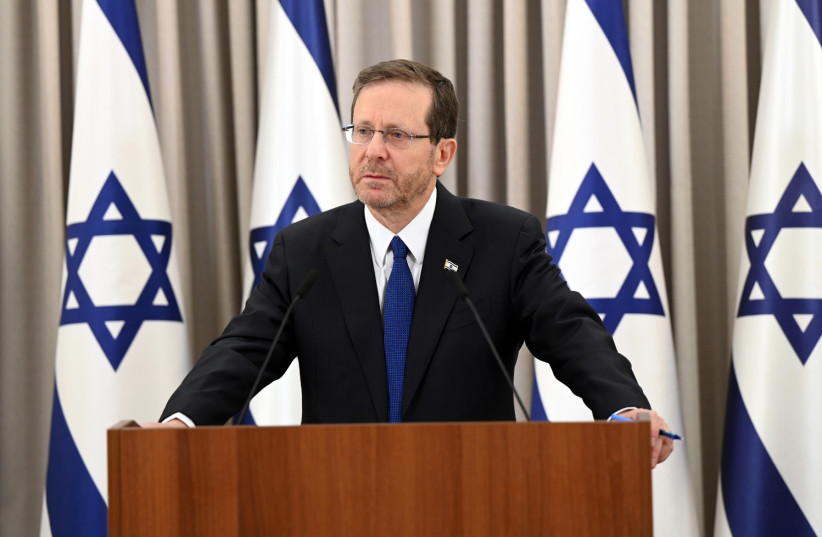President Isaac Herzog presented his judicial reform outline on Wednesday night.
The People's Outline is formulated as a single proposal that cannot be divided by provisions in a legislative process, as it ostensibly balances the powers in the different branches.
As Herzog noted in his speech, the president's proposal would not replace the Knesset's legislative process and would need to be passed as with any bill. The outline calls for a freeze of new Basic Laws, Israel's quasi-constitutional articles until the full outline is implemented. The proposal also calls for the cessation of any changes of the role between the branches, the Attorney-General and legal advisor, and the judiciary.
Judge Selection committee
The judge selection committee would have eleven members. Representing the judiciary would be the High Court of Justice President and two other judges. The Knesset would be represented by a coalition member and two opposition members from different factions. The government would be represented by three ministers. Notably, the composition would also include two jurist public representatives, who would be selected through agreement of the justice minister and the High Court president.
Judges will be chosen by a majority vote of seven members.

Basic Laws
A new law, Basic Law: Legislation would be introduced to create a special method for enacting Basic Laws.
Basic Laws would require four readings in a Knesset plenum. The proposal says that the first readings would be with a majority of 61, a fourth reading of 80 MKs, and a majority of 70 in a subsequent Knesset. Basic Laws dealing with elections would require an 80 MK majority in favor for all four readings.
Judicial review
Judicial review, the ability of the court to strike down unconstitutional laws, would be altered to be in line with the coalition demand that there will be no judicial review of Basic Laws. Judicial review of regular legislation will require a bench of 11 justices of which two-thirds are in agreement.
Another Basic Law on a negotiation outline on military and national service is proposed by Herzog's plan. It specifies that this law would also be immune from judicial review, which is redundant given the other provision on review of Basic Laws.
Human Rights
The High Court will continue to be able to exercise judicial review in connection to human rights derived from Basic Law: Human Dignity and Liberty.
Israel currently does not have an extensive human rights legal regime, but the High Court has long inferred human rights from the right of Human Dignity, which has been enshrined in law.
Rights that would be derived from Human Dignity include equality, prohibition of discrimination, free speech and opinion, and right of free assembly. The outline proposes that a concurrent program would be initiated at the President's Residence to consolidate these rights into a Charter of Basic Rights. This would also be negotiated on.
Reasonableness Clause
The reasonableness clause would be heavily restricted under Herzog's outline. The clause, which allows the court to interfere in administrative action beyond the scope of what is reasonable for a responsible authority, would not apply to government decisions in matters of policy and ministerial appointments during plenary sessions, and would be limited for ministerial policy decisions. It is unclear what form this limitation would take.
The coalition is currently promoting the so-called Deri Law 2 in the legislative process, which would prevent judicial intervention in ministerial appointments.
The court would still be able to apply the reasonableness clause for other state and public authorities.
Legal advisors
Under the proposal, legal advisers would serve one-year terms and could be transferred from their position over difference of opinion with the minister and with the approval of a special committee. The opinion of the Attorney-General and deputies would remain binding, but ministers would be entitled to receive separate legal representation before courts, a matter that has currently come to the forefront of discourse due to National Security Minister Itamar Ben-Gvir's disagreements with the Attorney-General and his demands to choose a legal representative.
Herzog also included a call for a plan to reduce the burden of the judicial system, but did not elaborate. In his previous five-point negotiation plan, Herzog called for the hiring of more judges to address inefficiency.
